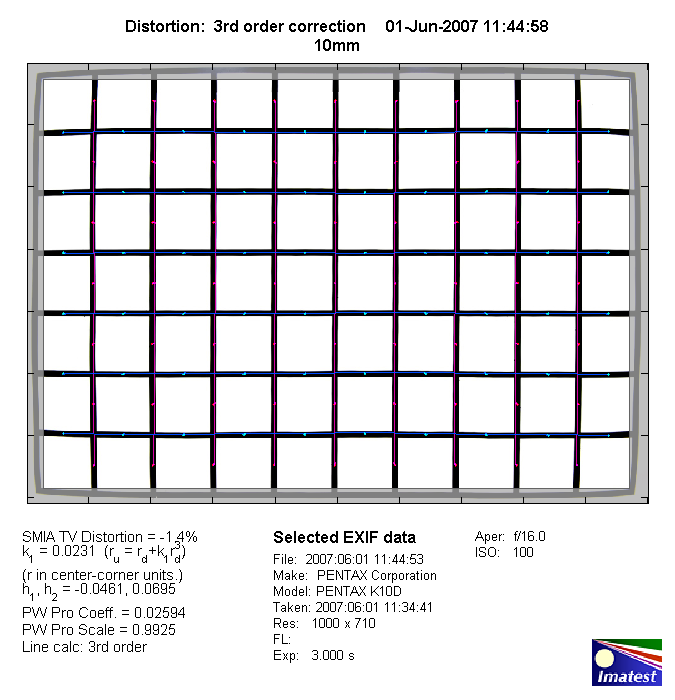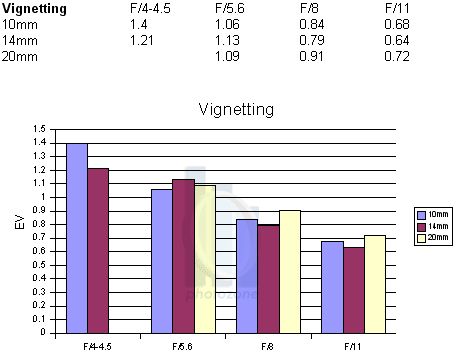|
Sigma AF 10-20mm f/4-5.6 EX DC (Pentax K) - Review / Test Report - Analysis |
|
Lens Reviews -
Pentax
|
|
Page 2 of 3

Distortion
The Sigma AF 10-20mm EX DC showed a rather unusual distortion characteristic.
At 10mm most of the image field is almost free of distortion so the measured distortion figures
look fairly fine here (taken a little inward from the borders). However, this is only part of the
truth. If you check the 10mm distortion chart below you will notice that the extreme corners
are actually quite (barrel-)distorted - probably in the 2-3% range. At 14mm the lens shows a
moderate degree of pincushion distortion, less so at 20mm.
|
Move the mouse cursor over the focal length text marks below to observe the respective distortion
|
| 10mm |
14mm |
20mm |
|

|
The chart above has a real-world size of about 120x80cm.
Vignetting
Typical for many ultra-wide zooms, especially those with an APS-C image circle, the Sigma
suffers from rather heavy vignetting problems which are most pronounced at 10mm @ f/4 (1.4EV).
At 14mm @ f/4.5 vignetting is not much better, a little less so at 20mm. Stopping down helps
the reduce the problem but actually a little less than desirable.
Please note that ultra-wide lenses exhibit some "natural" vignetting so it doesn´t/cannot
disappear completely anyway.

MTF (resolution)
The Sigma was capable to produce quite impressive resolution figures in the lab.
At 10mm the center performance is excellent straight from f/4. The border quality
is also on a very high level whereas the extreme corners suffer quite a bit at large
aperture settings. Stopping down results in a continuous increase of the extreme
corner quality till the sweet spot is reached at f/8. Beyond diffraction takes its toll.
At 14mm and 20mm the extreme corner performance is no longer a problem and the lens is
capable to achieve a generally excellent center resolution and very good borders.
The lens shows some field curvature at 10mm. Interestingly the "long end" performance
of the tested sample is a bit better than for the previously tested Canon and Nikon
variant of the lens - probably a sample variation issue.
Please note that the MTF results are not directly comparable across the different systems!
Below is a simplified summary of the formal findings. The chart shows line widths per picture height (LW/PH) which can be taken as a measure for sharpness.
If you want to know more about the MTF50 figures you may check out the corresponding Imatest Explanations
Chromatic Aberrations (CAs)
Lateral Chromatic aberrations (color shadows at harsh contrast transitions) are relatively
moderate for an ultra-wide zoom lens. At 10mm the average CA pixel width at the borders
can exceed 1.6 pixels which isn't good in absolute terms but still acceptable relative to
other lenses in this class. However, it is also worth to mention that the CAs are much
worse in the "extreme corners" at 10mm peaking beyond 3(!)px:
 
At 14mm and 20mm CAs are very well controlled and not field relevant.
Please note that CAs can be largely corrected via imaging tools such as Adobe Photoshop.

|